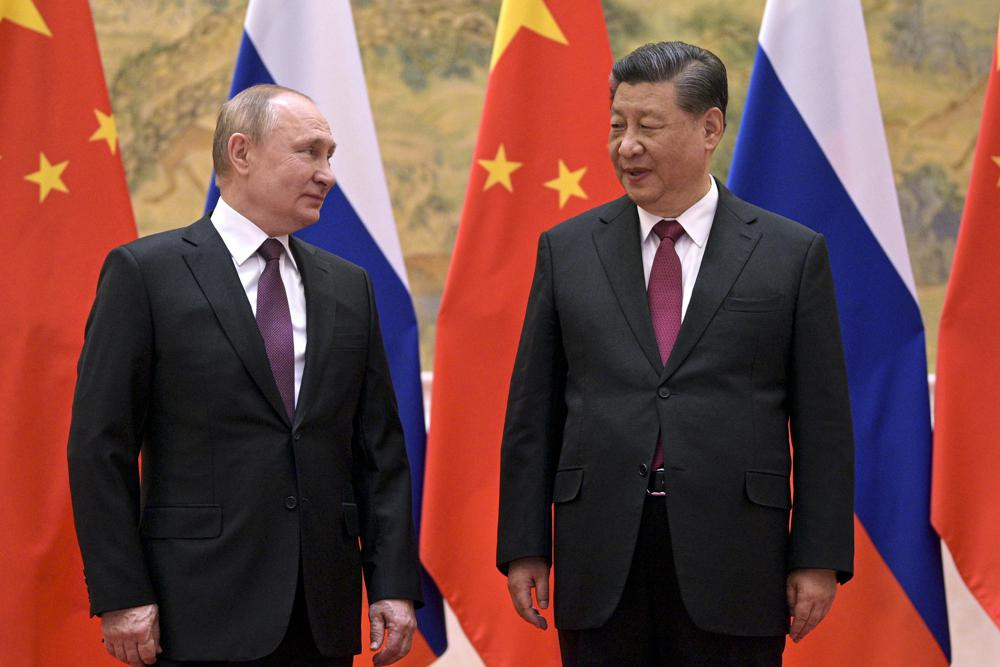Russia’s military buildup along its border with Ukraine is testing the possibility of a Moscow-Beijing axis lining up against the U.S. and its allies.
Russian leader Vladimir Putin’s meeting with Chinese counterpart Xi Jinping in Beijing this month fed speculation that a new alliance could form between the two great powers as they face off with the U.S. over a range of issues.
Russia and China have backed each other’s positions on opposing a NATO expansion in former Soviet republics and buttressing China’s claim to the self-governing island of Taiwan.
But the relationship remains lopsided. China’s confident rise as an economic and political force contrasts with Russia’s growing isolation and reversion to Cold War tactics of intimidation and bullying.
China also remains opposed to actions that could damage its territorial ambitions, from the South China Sea and Taiwan to the Indian border.
Here are some of the main factors driving, and blocking Russo-Chinese relations:
WHERE DOES CHINA STAND ON THE UKRAINE CRISIS?
China has not criticized Russia over its moves against Ukraine, and has joined in verbal attacks on Washington and its allies. Addressing the Munich Security Conference over the weekend, Chinese Foreign Minister Wang Yi lashed out against the U.S., accusing “a certain power” of “stirring-up antagonism.”
However, in response to a question from conference Chairman Wolfgang Ischinger, Wang said the “sovereignty, independence and territorial integrity of any country should be respected and safeguarded, because this is a basic norm of international relations.”
“Ukraine is no exception,” Wang added.
He also stated that major powers should act in defense of global peace and no country should “repeat the past mistake of forging rival alliances.”
That chimes with China’s longstanding opposition to military alliances and often invoked — but often breached in practice — policy of non-interference in other countries’ internal affairs.
The comments were also in keeping with Beijing’s quest to replace a global order underpinned by alliances it considers threatening to its own development. Those include NATO and newer groupings joining the U.S. with Japan, India, Australia and other states with which China has substantial foreign policy disputes.
WHAT DID THE XI-PUTIN SUMMIT ACHIEVE?
Xi and Putin met ahead of the opening ceremony of the recently concluded Winter Olympics in Beijing, after which they issued a lengthy joint communique seen as announcing a new and closer relationship.
The two sides said they “strongly support each other” in confronting what Xi called “regional security threats” and “international strategic stability,” without directly naming the U.S.
The meeting between the leaders marked their 38th contact in person and by phone, a number touted by Beijing as a sign of closeness between the countries that had been rivals for leadership in the Cold War’s socialist bloc.
The fall of the Soviet Union remains an obsession among Chinese Communist leaders, along with Putin, a former officer in the Soviet KGB who shares Xi’s authoritarian leanings and has aligned his foreign policies with those of Beijing while courting China’s market for Russian energy resources and military hardware.
In its own readout of the Xi-Putin meeting, however, China held back on making a full-throated endorsement of Russia’s strategy of attacking alleged Western threats to its security.
IS THERE A LINK BETWEEN UKRAINE AND TAIWAN?
China’s Communist Party leadership is believed to be watching the U.S. response to Russia’s actions closely for signs of how Washington would behave if Beijing were to move against Taiwan.
China has been dispatching military aircraft and holding threatening war games in hopes of undermining support in Taiwan for the self-governing island’s de facto independence.
Washington provides Taiwan with fighter jets, warships and other arms and is legally required to consider threats to the island as matters of “grave concern.” That doesn’t obligate the U.S. to intervene militarily on Taiwan’s behalf, but the possibility has not been ruled out, with allies such as Australia and Japan potentially joining in a conflict.
WHERE IS AMERICA LEFT IN THE DEBATE?
China is not putting its weight behind Russia’s foreign policy gambits, but the frostiness in relations with Washington shows no sign of thawing, said Shi Yinhong, a professor of international relations and director of the Center on American Studies at Beijing’s Renmin University of China.
“I believe that the Chinese government will continue to take care of China itself in the first place rather than take care of Russia,” Shi said. In the meantime, relations with Washington will remain fraught, particularly over the issue of Taiwan.
Beijing blames heightened tensions with the U.S. on what it calls a false depiction of China as a strategic rival.
This week marks the 50th anniversary of Richard Nixon’s visit to China that led to the establishment of formal diplomatic ties in 1979 and a new era of trade and economic relations. No joint celebrations have been announced.

